六级听力强化 课件2改
六级听力技巧
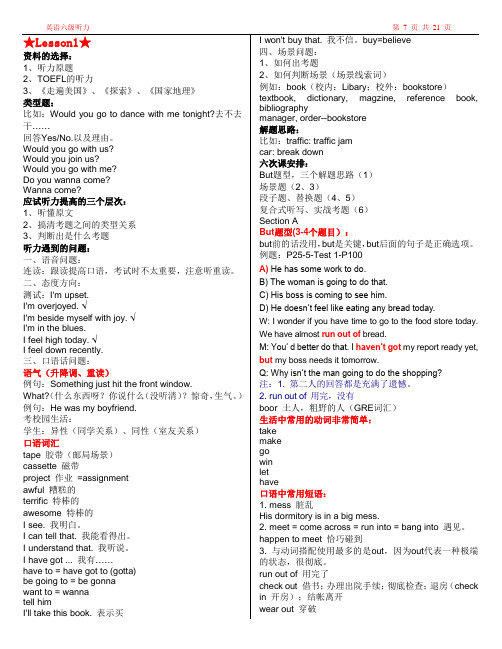
★Lesson1★资料的选择:1、听力原题2、TOEFL的听力3、《走遍美国》、《探索》、《国家地理》类型题:比如:Would you go to dance with me tonight?去不去干……回答Yes/No.以及理由。
Would you go with us?Would you join us?Would you go with me?Do you wanna come?Wanna come?应试听力提高的三个层次:1、听懂原文2、搞清考题之间的类型关系3、判断出是什么考题听力遇到的问题:一、语音问题:连读:跟读提高口语,考试时不太重要,注意听重读。
二、态度方向:测试:I'm upset. ×I'm overjoyed. √I'm beside myself with joy. √I'm in the blues. ×I feel high today. √I feel down recently. ×三、口语话问题:语气(升降调、重读)例句:Something just hit the front window.What?(什么东西呀?你说什么(没听清)?惊奇,生气。
)例句:He was my boyfriend.考校园生活:学生:异性(同学关系)、同性(室友关系)口语词汇tape 胶带(邮局场景)cassette 磁带project 作业=assignmentawful 糟糕的terrific 特棒的awesome 特棒的I see. 我明白。
I can tell that. 我能看得出。
I understand that. 我听说。
I have got ... 我有……have to = have got to (gotta)be going to = be gonnawant to = wannatell himI'll take this book. 表示买I won't buy that. 我不信。
he is a staff writer六级听力

he is a staff writer六级听力Part II Listening Comprehension(30minutes)Section ADirections:In this section, you will hear two long conversations. At the end of each conversation, you will hear four questions. Both the conversation and the questions will be spoken only once.After you hear a question,you must choose the best answ er from the four choices marked A),B),C)and D).Then mark the corresponding letter on Answer Sheet1 with a single line through the centre.Questions1to4are based on the conversation you have just heard.1. A) He is a staff writer.B) He is an adventurer.C) He is an author of fiction.D) He is a father of four kids.2. A) They are interested in fairy tales.B) They are curious and autonomous.C) They are a headache to their parents.D) They are ignorant of politics.3. A) He offers them ample editorial guidance.B) He recommends model essays to them.C) He gives them encouragement.D) He teaches them proofreading.4. A) Her tastes in books changed.B) She realized the power of reading.C) Her reading opened her eyes to the world.D) She began to perceive the world differently.【答案&原文】A B C AW:1) Mr. David Jackson, a staff writer at The New Yorker, is known for his non-fiction books of adventure. Today we go on a different kind of adventure –Jackson’s life of parenting his offspring. David, as a parent of an 11 and a 14-year-old, what is the most interesting issue you are dealing with right now?M: It’s easy to focus on the challenges.2) But so far, I find these ages to be kind of wonderful.They are independent, and they have their own curiosities and o bsessions. You can talk to them about fairly sophisticated subject matter such as politics.W: Yes, that does sound refreshing compared with talking to younger children. Do they ask you to proofread their essays? M: Certainly. With writing they do.3) I really just try to be encouraging. I think at this age, editorial guidance is less important than encouragement.W: Are there books that you think are important that your children read and that all children read?M: My general thought is to read widely and to incorporate a love for reading. Learning to love to read, I think, is the optimal thing, because it gives you a skill you can take anywhere.W: So you’re not too concerned like some parents with the content they’re reading. I know I have some worries about that.M: Yeah. Read what you like. If a child loves graphic novels or comic books, whatever it is that is turning them on to read and turning on their imagination.W: 4) I feel that children’s tastes in books change as they reach adolescence. I know that mine certainly did when I was a teenager. What do you think? M: I think it’s especially important as they get older to read subject matter that will open their eyes to the world and people. So, I think both fiction and nonfiction are really important, because they give you the power to begin to perceive the world through the lives of others.Questions 1 to 4 are based on the conversation you have just heard.1. What do we learn about David Jackson from the conversation?2. What does the man think of young teenagers?3. How does the man help his kids with their essays?4. What does the woman say about herself when she was a teenager?Questions5to8are based on the conversation you have just heard.5. A) She is a website designer.B) She is a university graduate.C) She is a main street store owner.D) She is a successful entrepreneur.6. A) They were repeatedly rejected by shops.B) They were popular with her classmates.C) They showed her natural talent.D) They were mostly failures.7. A) She had a strong interest in doing it.B) She did not like ready-made clothes.C) She could not find clothes of her size.D) She found clothes in shops unaffordable.8. A) Study fashion design at college.B) Improve her marketing strategy.C) Add designs for women.D) Expand her business.【答案&原文】D D C D。
大学英语四六级(cet-4、cet-6)听力技巧PPT
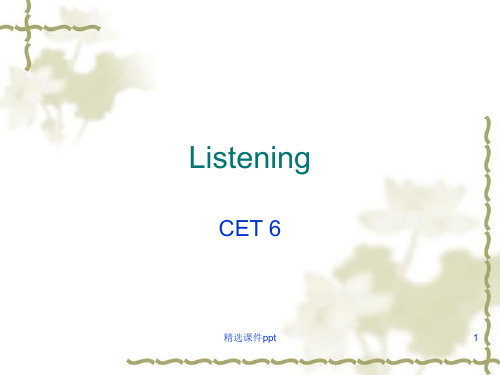
4
英语听力技巧总结:
1. indeed; actually;强调词是答案所在: 1). W: What do you think of the apple pie? I made it myself.
2.
M: Very delicious indeed. Even my mother's cannot match this.
❖ Q: What will the man most probably do?
❖
[A] Get some change from Jane [B] Use the woman's phone.
❖
[C] Go to look for a pay phone. [D] Pay for the phone call.
值500、标准差70的常模正精选态课件分pp。t ”
2
问题三:什么是机考?何时机考?
听力为基础的考题占了70%,剩下的30%是阅读; 1、 视频理解:分值25%; 2、 听力填空:分值10%; 3、 会话跟读:分值10%; 4、 阅读理解:传统阅读 选择题 20%,
快速阅读,题型判断、选择或填空,分值10%; 5、 语法句型:以视频和阅读材料为基础,回答语法问题,
精选课件ppt
5
3.否定即答案所在
ቤተ መጻሕፍቲ ባይዱ
1)M: Jessica, could you send this emails to all the club members?
❖ W: Sorry, the computer broke down this morning. I will send for you
❖ as soon as I have fixed.
《六级听力技巧介绍》课件

模拟练习与实战演练
模拟考试
进行模拟考试,提升应对真实考 试的能力。
听力练习
多听多练,熟悉各种题型和听力 材料,提高听力技巧。
实战演练
参加真实的模拟考试,了解考试 环境,查漏补缺。
备考要点和注意事项
充分了解考试要求
详细了解六级听力考试的内 容、时间和评分标准。
做好时间管理
掌握答题时间,合理分配时 间给不同题型。
《六级听力技巧介绍》 PPT课件
在六级考试中,提高听力技巧非常重要。本课程将介绍六级听力考试的特点, 以及提高听力技巧的方法。
为什么听力技巧重要?
1 更好的学习理解
听力技巧能帮助你更好地 理解听到的内容,提高学 习效果。
2 应对考试挑战
六级听力考试要求学生在 有限时间内准确理解和回 答问题,良好的听力技巧 是应对挑战的关键。
3 日常交流能力
良好的听力技巧也对日常 生活中的听力理解和交流 产生积极影响。
如何提高听力技巧?
多听多练
通过频繁听英语材料并进行练习,可以提高听力技巧和听力反应速度。
注重整体理解
不要只追求个别词语的理解,要注意抓住整体语境,理解对话或文章的主旨。
掌握答题技巧
了解不同题型的解题技巧和答题方法,提高答题准确率。
常见听力题型分析与解题技巧听力短对话题型仔细瞄准问题关键词, 关注说话者的意图和 态度。
听力长对话题型
抓住对话的主旨和重 要信息,注意对话者 之间的关系与态度。
听力短文题型
注意文章的结构和要 点,抓住关键信息, 进行快速理解。
听力长文题型
注意文章的逻辑结构 和段落关系,捕捉关 键信息,掌握文章大 意。
注意听力材料的不同出 处
熟悉不同来源的音频材料, 适应不同的口音和语速。
英语听力公开课PPT课件
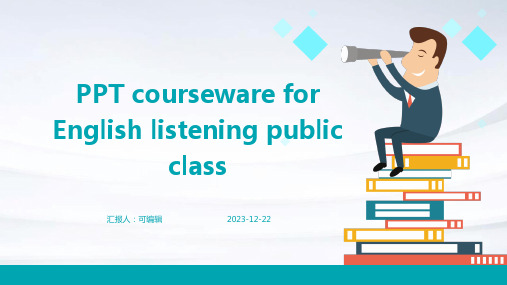
延时符
Analysis of Listening Materials
News reports
These are reports on current events, published in newspapers, on radio or on the Internet They are usually about 200-300 words long and are designed to provide information about recent events
延时符
Listening skills
Comprehension of main ideas
The ability to understand the overall message or point of a spoon pass, including the introduction, conclusion, and main points
Recognition of important details
The ability to identify and understand specific information or details within a spoon passage, such as names, dates, locations, and events
The course includes interactive activities and exercises to help participants apply what they learn in real world settings
It is suitable for learners at intermediate and advanced levels of English proficiency
大学六级考试备课教案模板
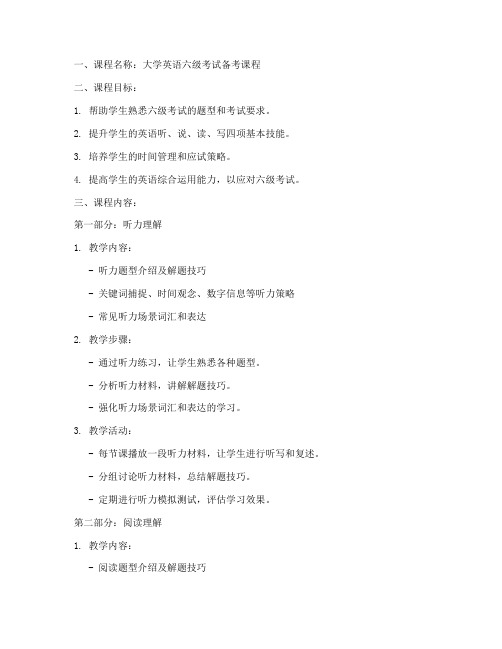
一、课程名称:大学英语六级考试备考课程二、课程目标:1. 帮助学生熟悉六级考试的题型和考试要求。
2. 提升学生的英语听、说、读、写四项基本技能。
3. 培养学生的时间管理和应试策略。
4. 提高学生的英语综合运用能力,以应对六级考试。
三、课程内容:第一部分:听力理解1. 教学内容:- 听力题型介绍及解题技巧- 关键词捕捉、时间观念、数字信息等听力策略- 常见听力场景词汇和表达2. 教学步骤:- 通过听力练习,让学生熟悉各种题型。
- 分析听力材料,讲解解题技巧。
- 强化听力场景词汇和表达的学习。
3. 教学活动:- 每节课播放一段听力材料,让学生进行听写和复述。
- 分组讨论听力材料,总结解题技巧。
- 定期进行听力模拟测试,评估学习效果。
第二部分:阅读理解1. 教学内容:- 阅读题型介绍及解题技巧- 快速阅读和精读的方法- 阅读理解中的常见问题及应对策略2. 教学步骤:- 讲解阅读题型和解题技巧。
- 引导学生进行快速阅读和精读练习。
- 分析阅读材料,总结常见问题及应对策略。
3. 教学活动:- 每节课选取一篇阅读材料,让学生进行阅读练习。
- 分组讨论阅读材料,总结阅读技巧。
- 定期进行阅读模拟测试,评估学习效果。
第三部分:写作1. 教学内容:- 写作题型介绍及解题技巧- 常用写作模板和句型- 写作中的常见错误及修改方法2. 教学步骤:- 讲解写作题型和解题技巧。
- 引导学生运用写作模板和句型。
- 分析写作练习,指出常见错误及修改方法。
3. 教学活动:- 每节课进行写作练习,让学生运用所学模板和句型。
- 分组讨论写作练习,互相评价并提出改进建议。
- 定期进行写作模拟测试,评估学习效果。
第四部分:翻译1. 教学内容:- 翻译题型介绍及解题技巧- 常见翻译难点及应对策略- 翻译中的常见错误及修改方法2. 教学步骤:- 讲解翻译题型和解题技巧。
- 引导学生分析翻译难点及应对策略。
- 分析翻译练习,指出常见错误及修改方法。
《HSK六级辅导》课件

反馈与指导
提供详细的答案解析和 反馈,帮助学生找出自 己的不足之处。
听力模拟试题
A
模拟真实考试环境
模拟真实的HSK六级听力考试环境和流程,让 学生更好地适应考试。
全面题型覆盖
涵盖HSK六级听力考试的所有题型,确保 学生得到全面的练习。
B
C
丰富表达方式
逻辑结构清晰
在写作时要注意逻辑结构,合理安排 段落和布局,使文章条理清晰。
学会使用不同的词汇和表达方式,使 文章更加生动有趣。
写作练习
段落练习
通过段落练习,让学生逐步掌握 写作技巧,提高写作水平。
命题作文
根据不同的主题,让学生进行命 题作文练习,锻炼学生的写作能
力。
自由发挥
鼓励学生自由发挥,表达自己的 观点和想法,培养创新思维。
为考生提供赴中国留 学、商务、探亲等活 动的语言资格证明。
考试内容
听力理解
评估考生理解汉语口语 的能力。
阅读理解
评估考生阅读并理解书 面汉语的能力。
书写理解
评估考生理解汉字书写 和语法结构的能力。
口语表达
评估考生用汉语进行口 头表达的能力。
考试形式
01
笔试
包括听力、阅读和书写三个部分,总时长约2小时30分 钟。
积极心态
保持乐观的心态,将考 试看作是展示自己能力 的机会。
谢谢聆听
02
口试
与考官进行面对面的汉语交流,时长约10-15分钟。
03
成绩报告
提供听力、阅读、书写和口语四个部分的分数,以及总 分数。
02 HSK六级听力辅导
听力技巧
定位关键信息
在听力材料中,快速定位关键信息和细节, 有助于理解整体内容。
英语六级课件PPT

(二) 作文评分标准
1. 本题满分为15分。 2.阅卷标准共分五等: 2分、5分、8分、11分及14分。各有
标准样卷一至二份。
3. 阅卷人员根据阅卷标准,对照样卷评分,若认为与某一 分数(如8分)相似,即定为该分数(即8分),若认为 稍优或稍劣于该分数,即可加一分(即9分)或减一分 (即7分).
Listening Comprehension 35 minutes 249分
Reading Comprehension 25 minutes
(Reading in Depth)
178分
Answer Sheet 2
Cloze
15 minutes 71分
Translation
5 minutes 35分
完型填空部分的短文有20个空白,空白处所删去 的词既有实词也有虚词,每个空白为一题,每题 有四个选择项。要求考生根据对文章的理解,选 择一个最佳答案,使短文的意思完整和结构正确。 完型填空部分的短文长度为250~300词;分值 比例为10%,考试时间l5分钟。
写作和翻译
写作(Writing)和翻译(Translation)部分测试学生用英语 进行书面表达的能力,所占分值比例为20%,其中写 作15%,翻译5%,考试时间35分钟。
4)词汇范围不超出《教学要求》中较高要求的词 汇,超出该范围的关键词汇,影响理解时,则以 汉语或英语释义。
•
• CET 6 Writing
•
•
高分写作
一、六级写作评分标准
大学英语六级考试作文的目的旨在考核学生英 语书面表达的能力。作文考试时间为30分钟, 要求写出不少于150个词的短文。六级考试作 文的出题方式有:命题作文,看图画或图表作 文,根据所给文章(英文或中文)写出文章摘 要或大意,给出关键词作文等。考试的作文内 容为社会、文化或日常生活的一般常识,不涉 及知识面过广、专业性太强的内容。对作文的 要求是:切题,文理通顺,表达正确,意思连 贯,无重大语言错误。
《大学英语六级技巧》课件

本PPT课件旨在介绍大学英语六级考试的技巧和备考要点,帮助考生更好地应 对和取得优异成绩。
概述
内容和形式
介绍六级考试的考点和考试形式,包括听力、 阅读、写作和翻译。
重要性和作用
强调六级考试对学生英语能力的检测和对大学 学习的重要性。
阅读技巧
基本阅读技巧
快速阅读、扫读、精读等不同的阅读方法,帮助掌 握大意、理解细节。
制定科学的备考计划,并提供如何提高语言水平和冲刺高分的实用建议。
结束语
考试要求和技巧
总结六级考试的要求,强调技巧在Leabharlann 高成绩中的重 要性。积累和努力
提醒考生不要忘记平时的积累和自我提高的努力, 为取得好成绩努力奋斗。
掌握句子结构的多样性,灵活运用不同句型和语境来表达自己的观点。
翻译技巧
一般要求
了解翻译考试的一般要求,包括准确表达、积极适 应语言风格等。
注意事项
克服词汇有限、语法结构复杂和语言间的差异等翻 译考试难点。
注意事项和备考技巧
1 考试注意事项
了解考试时间、答题规则等注意事项,合理安排答题时间。
2 备考计划和练习建议
答题技巧
定位、推断、概括等答题技巧,提高解答阅读理解 题的准确性和效率。
听力技巧
1
不同语速和口音
针对不同语速和口音的听力材料,提供
听力答题技巧
2
有效的分辨和理解技巧。
预测、定位、完成表格等解答听力题的 方法和技巧。
写作技巧
文章结构和段落
学习如何合理组织文章结构和段落,使文章逻辑清晰,层次分明。
句子结构和语境
大学英语四六级PPT课件

Writing and Translation
准确表达思想
在写作和翻译部分,考生需要准确表 达自己的思想,做到语言流畅、逻辑 清晰。可以通过审题、构思、草拟提 纲以及反复修改来提高表达的准确性。
Writing and Transla生需要掌握英语的 基本语言结构,包括句子结构、时态、语态 等。可以通过学习语法规则、积累词汇以及
reading comprehension
推理判断
在阅读理解部分,考生需要根据文章提供的信息进行推理判断,推断出隐含的意义和结论。可以通过 分析文章中的逻辑关系、上下文语境以及作者的观点态度来进行推理判断。
Listening comprehension
捕捉关键信息
在听力理解部分,考生需要快速捕捉关键信息,理解听力材 料的主要内容。可以通过关注听力材料的开头和结尾、定位 关键信息和筛选无关信息来捕捉关键信息。
don't miss any key information.
Common question types and problem-solving techniques
Multiple choice
Use elimination techniques to narrow down the answer choices.
• Analysis: The model test is used to familiarize students with the exam format and provide feedback on areas where they need to improve.
Simulated test questions and analysis Model Test
大学英语四六级考试培训学生教育PPT

的教学目标是。
级
考试摘要
培养学生的英语综合 应用能力,特别是听 说能力,使他们在今 后工作和社会交往中 能用英语有效地进行 口头和书面的信息交
流。
考试摘要
《大学英语课程教学要求 (试行)》(以下简称 《教学要求》)。
过级考试摘要
IMPORTANCE OF PASSING ENGLISH
为适应我国高等教育新的发展形势,深化教学改革,提 高教学质量,满足新时期国家对人才培养的需要。
过级考试摘要
IMPORTANCE OF PASSING ENGLISH
四
考试摘要
《大学英语课程教学 要求(试行)》(以
下简称《教学要 求》)。《教学要求》 规定,大学英语课程
的教学目标是。
六
考试摘要
《大学英语课程教学 要求(试行)》(以
院发布通知,明确 2017年安徽省全国 英语等级考试(PETS)
停止考试。
英语重要性
这一通知的依据在于: 国务院2014年颁布 的关于深化考试招生 制度改革的实施意见 中,明确提出外语考 试改革目标。
英语重要性
即到2020年基本建 成标准统一、功能多 元的现代化外语测评 体系。 2020年5月 29日,教育部考试中
主要讲师:XXX 时 间 : X 年 X 月
目录
CONTENTES
01. 四六级重要性 IMPORTANCE OF PASSING ENGLISH
02. 过级考试摘要 IMPORTANCE OF PASSING ENGLISH
03. 举办时间方式 IMPORTANCE OF PASSING ENGLISH
的教学目标是。
大学英语六级听力讲座专项强化真题试卷1(题后含答案及解析)
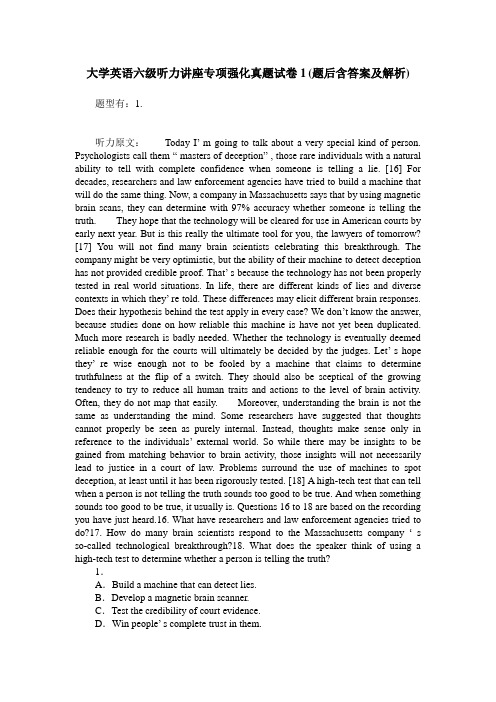
大学英语六级听力讲座专项强化真题试卷1(题后含答案及解析) 题型有:1.听力原文:Today I’m going to talk about a very special kind of person. Psychologists call them “ masters of deception” , those rare individuals with a natural ability to tell with complete confidence when someone is telling a lie. [16] For decades, researchers and law enforcement agencies have tried to build a machine that will do the same thing. Now, a company in Massachusetts says that by using magnetic brain scans, they can determine with 97% accuracy whether someone is telling the truth. They hope that the technology will be cleared for use in American courts by early next year. But is this really the ultimate tool for you, the lawyers of tomorrow?[17] You will not find many brain scientists celebrating this breakthrough. The company might be very optimistic, but the ability of their machine to detect deception has not provided credible proof. That’ s because the technology has not been properly tested in real world situations. In life, there are different kinds of lies and diverse contexts in which they’ re told. These differences may elicit different brain responses. Does their hypothesis behind the test apply in every case? We don’t know the answer, because studies done on how reliable this machine is have not yet been duplicated. Much more research is badly needed. Whether the technology is eventually deemed reliable enough for the courts will ultimately be decided by the judges. Let’ s hope they’re wise enough not to be fooled by a machine that claims to determine truthfulness at the flip of a switch. They should also be sceptical of the growing tendency to try to reduce all human traits and actions to the level of brain activity. Often, they do not map that easily. Moreover, understanding the brain is not the same as understanding the mind. Some researchers have suggested that thoughts cannot properly be seen as purely internal. Instead, thoughts make sense only in reference to the individuals’external world. So while there may be insights to be gained from matching behavior to brain activity, those insights will not necessarily lead to justice in a court of law. Problems surround the use of machines to spot deception, at least until it has been rigorously tested. [18] A high-tech test that can tell when a person is not telling the truth sounds too good to be true. And when something sounds too good to be true, it usually is. Questions 16 to 18 are based on the recording you have just heard.16. What have researchers and law enforcement agencies tried to do?17. How do many brain scientists respond to the Massachusetts company ‘s so-called technological breakthrough?18. What does the speaker think of using a high-tech test to determine whether a person is telling the truth?1.A.Build a machine that can detect lies.B.Develop a magnetic brain scanner.C.Test the credibility of court evidence.D.Win people’ s complete trust in them.正确答案:A解析:题干问的是研究人员和执法机构一直在努力做什么。
CET6 听力技巧 PPT课件
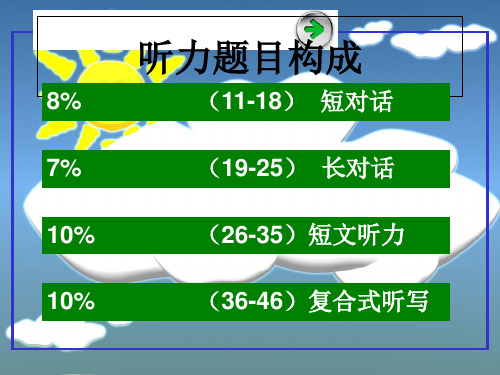
听力常见问题 • 听不懂? • 听什么? • 怎么听?
听不懂
• 语速 • 发音 • 语音语调 • 练习
听什么
小词、短语(一词多意)
• There are a few openings at the job market
• -pick up game/pick up table • Check it out
短对话十大题型+考点
• 数字价格计算题 • 时间加减计算题 • 场景地点题 • 意见建议题 • 人物关系题
• 人物意图题 • 中心思想题 • 态度推断题 • 细节推断题 • 意义解释题
数字价格计算题
数字价格计算题
• 数字发音问题 • 打折、折扣 • Discount (rate),on sale, 20% off,
coupon • 大数字听写
时间加减计算题
• 超前 In advance/ahead of time • 准时 On time/on schedule • 滞后(推迟)
behind schedule/delay/late/postpone/Put off/hold up
场景地点题
场景地点题
• Question: Where does this conversation most probably take place?
- 1、下载文档前请自行甄别文档内容的完整性,平台不提供额外的编辑、内容补充、找答案等附加服务。
- 2、"仅部分预览"的文档,不可在线预览部分如存在完整性等问题,可反馈申请退款(可完整预览的文档不适用该条件!)。
- 3、如文档侵犯您的权益,请联系客服反馈,我们会尽快为您处理(人工客服工作时间:9:00-18:30)。
重庆新东方罗登科
教学目标
小对话场景练习
听写做题步骤
1、日常生活类
小对话场景
交际:hang out, talk with, think of, get
along with, make up story, pick up, on time, get on/off, mobile phone, cell phone, telephone booth(公用电话亭), pay phone(投币式公用电话), long distance call(长途电话), message, keep contact.
课程:semester, term, compulsory course, optional course, registration, register, call on, review, brush up on
2、校园生活类
考试:midterm exam, final exam, credit, score, fail, pass
1、日常生活类
购物:style, department, shop assistant, clerk, jeans, jacket, size, design, on sale, for sale, counter, fitting room
家务:dining room, ladder, housework, house keeper, housewife, laundry, dish
4、旅游交通类
second-hand automobile, garage, give sb a ride, gate, check-in, leave for, travel agency, gear, one-way street, sign, break down, flat tyre, rush hour, traffic jam, delay,
教职工:professor, scholar, instructor, tutor, teaching assistant, dean
3、职场工作类
谈论工作:job-hunt, letter of application, apply for, resume, colleague, routine, promote, make the effort, gains and losses, work overtime, extra hours
健康:surgery, surgeon, physician, doctor, nurse, symptom, prescription, operation room, emergency room, fever, cough, flu, a sore throat, temperature, injection
1、日常生活类Байду номын сангаас
电影:horror movie, action movie, comedy, tragedy
社会问题:murder, death, peace, social welfare, tax, revenue, optimistic, pessimistic
2、校园生活类
图书馆:librarian,author, borrow, due, overdue, fine, catalogue, reference book, document, journal, periodical
5、饮食健康类
饮食:fried food, sugar, soup, soap, delicious, appetizing, starve, restaurant, school dining hall, waiter, waitress, order, make the reservation, eat out, take away, treat, be on diet
听写做题步骤
听写做题顺序:
1、预览原文判定词性,标记词形
2、第一遍放音时写1、3、5、7、9(跳着写)
3、第二遍放音时按顺序写
4、第三遍放音时精听词形细节 5、查漏补缺,誊写答案
听写做题步骤
第一遍:首1-2字母,单词非常简单可以 直接写出来。要是写不出来会耽误你听下 一个单词。 第二遍:补全
第三遍:补写 + 检查(注意自己的书写)
听写技巧:在有可能填名词的空 格中,预览时先提前写个复数形 式s,以免真正听写时忘记。
